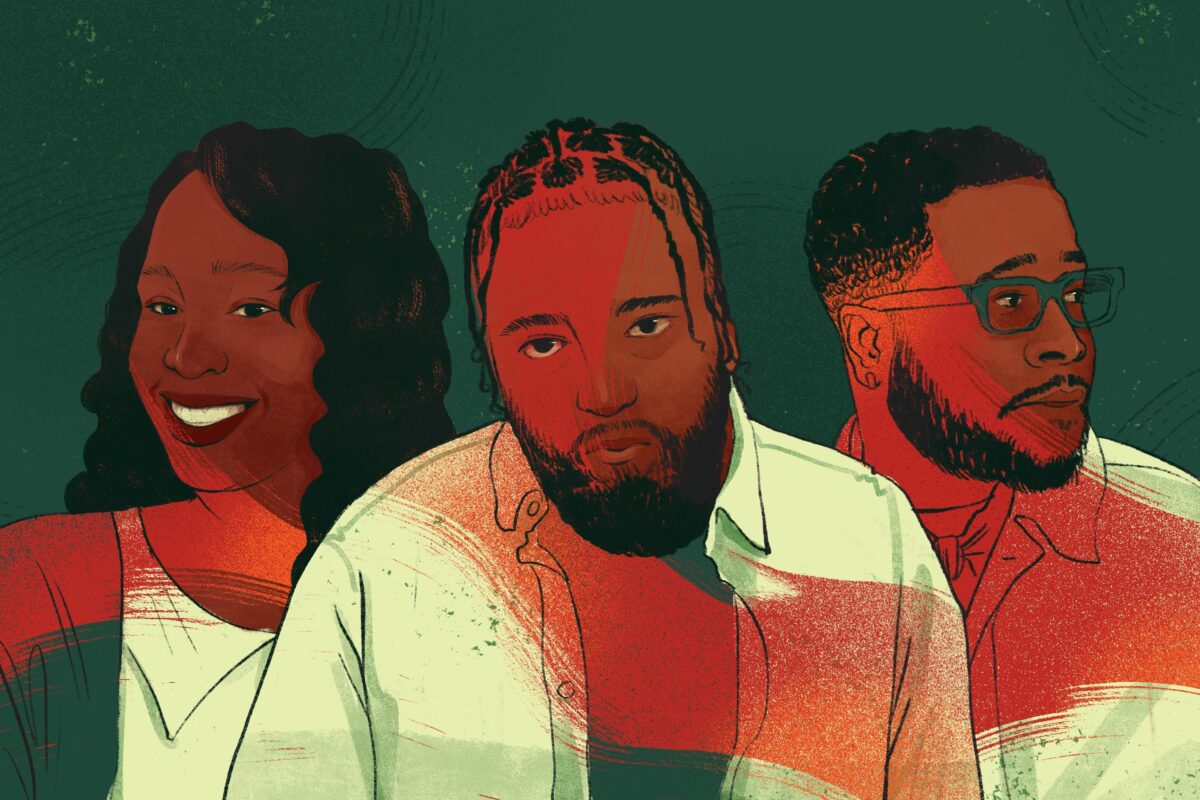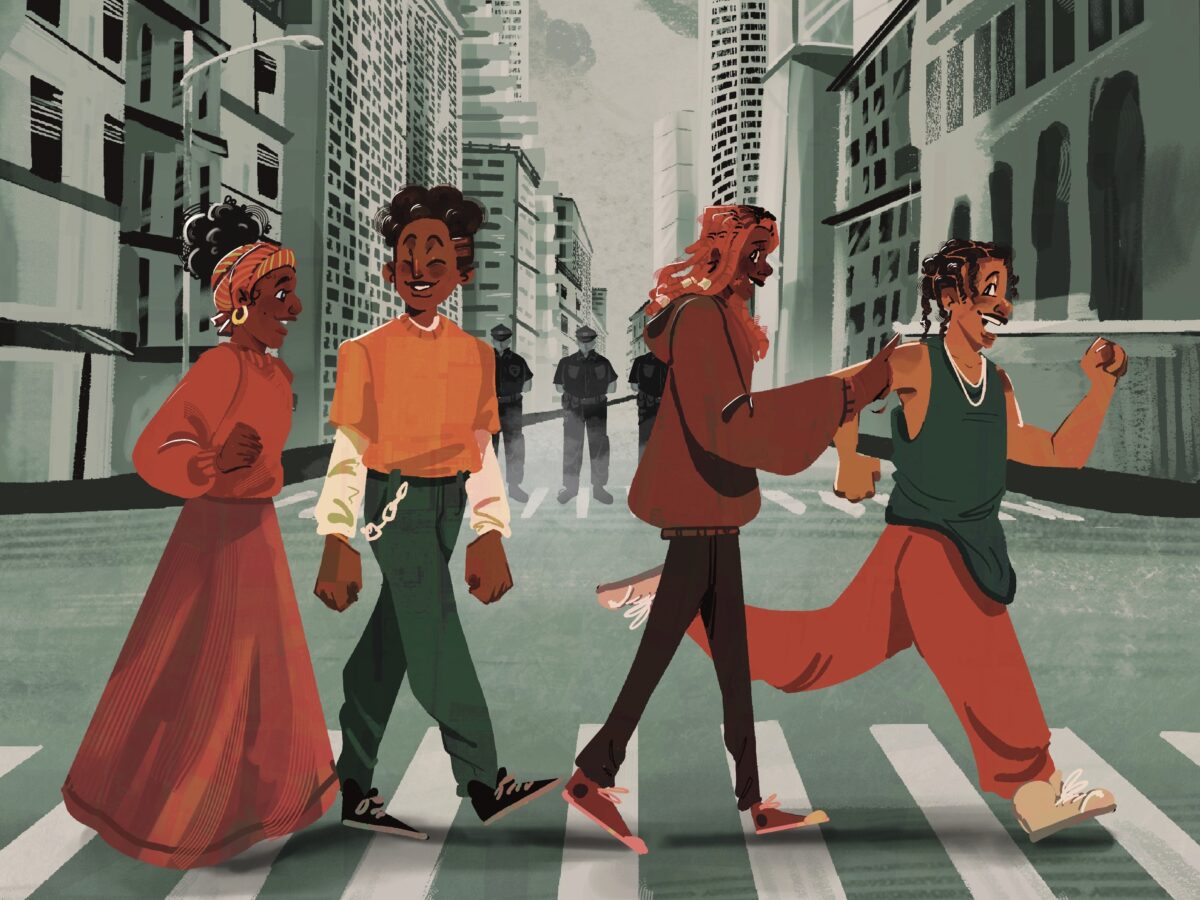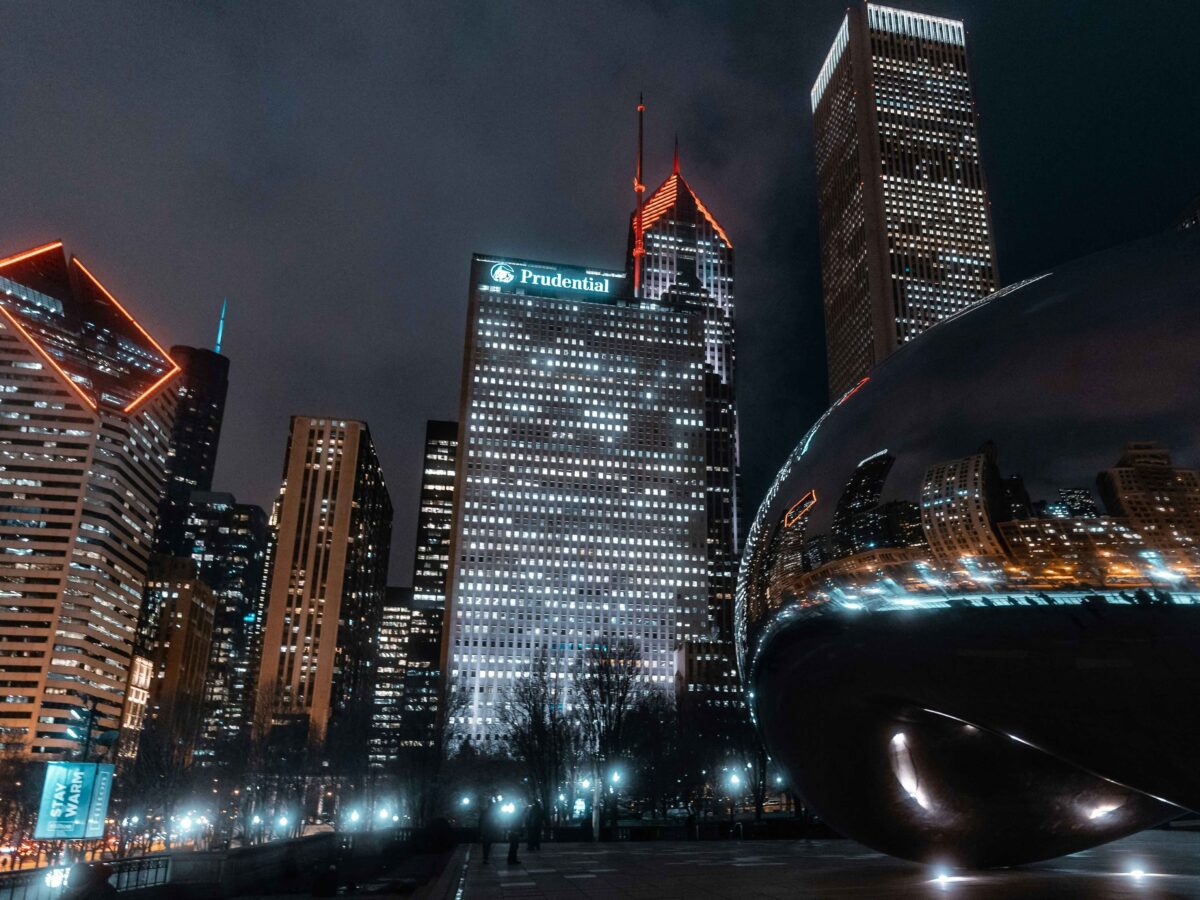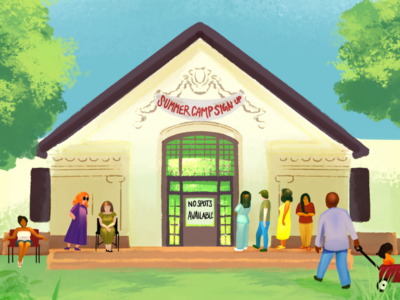This article was co-published in partnership with The TRiiBE.
With the weather warming up and the school year winding down, young people in Chicago are spending their weekends — and soon, weekdays as well — looking for something to do.
They might find there isn’t much out there for them. Third spaces have disappeared or been cut off from teenagers, and the COVID-19 pandemic locked many at home for months. Not long ago malls in and around Chicago were the go-to spot for high schoolers with nothing to do, which eventually led to parental supervision rules at Water Tower Place and a youth escort policy at Ford City Mall. These restrictions essentially ban teens seventeen or younger from being at these malls starting Friday evening and spanning the entire weekend, unless they’re accompanied by a parent or adult over twenty-one.
In that gap, social media — which may be to blame for higher rates of boredom in young people — provides teenagers with access to constant communication with each other. It has also provided a way to quickly organize large gatherings known as “trends.” At times, violence has erupted at trends.
“Trends,” also called “teen takeovers,” have resurfaced year after year. They’re often met with a massive police response, and when they’ve gotten out of hand or turned violent, city officials have called for curfews. Then-Mayor Lightfoot moved the weekend curfew up one hour permanently in 2022 after a fatal shooting at a teen takeover in Millenium Park. Now, the City Council is considering an ordinance that would allow police to call a “snap” curfew at a large gathering and give teenagers in the area thirty minutes to disperse. Any who refused could see their parents face fines that would increase with repeated violations.
Another response is to ask — sometimes facetiously — where the teenagers’ parents are.
To get insight about the complex answers to that question, the Weekly sat down with three parents of Black teenagers to discuss their experiences raising them in the age of TikTok and trends.
These interviews were edited for length and clarity.
Camella Clark was born and raised in Altgeld Gardens, a public housing complex on the far South Side. While attending Whitney Young High School, Clark had her eldest daughter at seventeen, and after obtaining her GED and went straight to nursing school. Her sixteen-year-old-son was a student at Morgan Park High School until recently when he moved out of state.
South Side Weekly: What are some differences you noticed between raising a teenager now in comparison to your first child, or what your parents may have experienced when raising you?
Camella Clark: So with my daughter, who’s the oldest, even though social media was around, it wasn’t as prevalent as it is now. There was a little Facebook, I think Snapchat had just kind of came about, but now everything they do is recorded, and they don’t know how to keep things private sometimes. They’re not necessarily doing things that teenagers haven’t done before, but there wasn’t [as much of] a digital footprint.
How do you go about safety and monitoring your son? How do you keep up with what he has going on?
Anytime he downloads an app, I have to give permission for it to download. Now he lives with his dad, he just moved a few months ago, but we do spot checks on the phone. What are you looking at, what are you engaging in? But on the flip side, he’s sixteen and he’s not sheltered, he goes to school with other children. So even though we have certain rules and regulations and things that we live by, the people that he’s surrounded by may not, but he needs to know that we’re watching him. That’s how we try to keep a hand in what he’s still doing; even though he’s getting older, he’s still only sixteen.
What are some spaces and activities that Black youth could benefit from on the South and West Sides?
Even though I grew up in public housing, we still had so many resources within the school system. We had gym, recess, we had actual extracurriculars already built into the school schedules, so there wasn’t a need to worry about after school stuff or before school stuff —and a lot of things were offered in our neighborhood schools. That’s another issue; neighborhood schools have been demonized. Those students are considered the “leftovers” that couldn’t get into this or that… . So it’s a lot of things going on that is really pushing kids to seek fun elsewhere.
What do you think about the proposed solution that would empower CPD to call snap curfews at any hour if they see a large teen gathering?
So that’s a double-edged sword. You definitely want to keep the kids safe, and you don’t want things to get out of proportion to where police have to either step in and do something undesirable, or kids get in a mob and do things—you do want to prevent that, but also that curfew is, of course, targeted towards Black children. However, it might be a necessary evil, but that may lead to a slippery slope if they’re just able to pull random curfews out of thin air. I’m like, hey, what’s this, martial law? It is a slippery slope. But unfortunately, especially now it’s the summertime, if they don’t conduct themselves in the proper manner, it just might have to happen because you have other people that want to enjoy downtown without worrying about getting caught in a bunch of teenagers.
Ro Moore is a dad of two from the South Side. He now lives with his family in Naperville where he’s raised his now eighteen-year-old daughter. Aside from playing sports, as a teen he stayed out of the way and focused his time on making beats.
What contrasts do you notice when comparing raising a child in 2025 versus what your parents may have experienced?
Moore: The biggest difference is that the internet is so ingrained into this generation’s personal life; they spend so much of their social energy online that they don’t have a lot to give in real life.
When we were at school and something embarrassing happened, fights, anything—we went home, and that was the end of it. Now, because of the internet, it just carries over. So something embarrassing happens, it’s not over, everybody’s on the same internet, on the same social media platforms, you guys are bringing school home with you. These kids suffer more with cyber bullying because you never really leave that community.
When you come home, you guys are on Twitch together, on Discord together, you guys hop on the game, you’re on PlayStation together, you’re on Xbox Live together. Since COVID, the world has become exponentially smaller for them to the point where they interact with each other without boundaries.
What do parents need from schools, city agencies, or communities to feel more equipped?
There needs to be more initiatives for the city to listen to the people, I don’t even know where to start. There’s just so much that both me and you can think of about different deficiencies, about the lack of care or lack of resources available for so many different areas, from back when you were in school, from back when I was in school, from back when my parents were in school, that’s still prevalent today, When [residents in Wrigleyville] have a problem with some stuff, things change. When the South Side and the West Side speak about different things and show up to town halls, they’re met with vitriol. They’re met with suppression.
What do you think about the proposed curfew?
I think a lot of these policies being introduced aren’t to stop these things from happening within our community, they’re to stop where they happen. Because y’all didn’t care, and y’all haven’t cared, that this exact same thing has been happening to the South Side, to the East Side, and to the West Side. It’s when they come downtown and y’all pass a certain threshold, we got to do something about it because you’re making other demographics feel uncomfortable. Everybody wants to come see the Mag Mile and the Bean and Buckingham Fountain, but don’t nobody want to see that if all these teens are getting off the Millennium station line and coming up there and just being teenagers, they don’t want to do that if it’s too many Black people.
Anytime they set rules or laws like this to disenfranchise one part of the community, it ends up negatively affecting the rest of the community, whether they mean to or not. That’s a historical fact.
What do you think is an alternative to the proposed curfew solutions?
If there were more age-friendly concerts, shows, exhibits, etc. How do we have all of these fantastic institutions, museums and things, and there’s nothing geared towards engaging the next generation? Y’all not trying. You put all this effort into trying to blockade them from messing up what money you think is there, instead of engaging them and making money from them, making money with them.
Y’all missed the opportunities to engage and provide space for these communities, and instead just want to blockade them away. It’s just gonna breed rebellion and contempt, and a lot of what you think you’re preventing or stopping, you just exacerbate.
Instead of just saying ‘stop this, you can’t do this,’ say ‘y’all can’t do this, but we got this for y’all in the summer.’
Lon Renzell Rudolph moved to Chicago to attend Columbia College in 2007. His daughter, who turns sixteen on May 21, goes to school in Alsip, a southwest suburb. As a teen, Rudolph frequented the local YMCA and teen night clubs, while his time spent at church helped him discover his love for music.
What are some challenges parents face raising teenagers, especially within the past five years?
I think social media was the biggest thing that I worried about, just like creeps and predators. But my daughter is not as vain as some people might be as teenagers, she’s recently finding herself. She’s not influenced by what’s happening and what other girls are doing around her—whatever girls are saying, what they’re wearing, she’s not trying to wear the flyest, newest shit, but she’s gonna wear her thing and be comfortable within herself. I’m really seeing her grow into that, and it was definitely a worry of mine like “damn, am I gonna have to be this type of strict parent when she’s two to twelve years old and say ‘don’t go on the internet, don’t do these things, don’t wear these things, don’t talk like that’?” My parents were like that — very strict about how I talked, what I was doing, who my friends were. I felt like I was gonna do the same thing, but with her I didn’t have to do that. I was just very vocal with her and kept it honest.
What do parents need from schools, city agencies, and the communities that their teenagers are growing up in to feel supported?
Guidance counseling needs to be more [proactive about] getting the parents involved and talking to their kids. My kid doesn’t have problems talking to us, but I know that’s where a lot of parents go wrong — they don’t know how to talk to their kids [especially] if they’re a little older. But I feel like if there was a therapist on site— the guidance counselor gets [more involved with] college prep and finding the best classes instead of like, “how are you doing today?” and “are there things you can’t tell your parents that you need to let us [know]?” and I think that’s super huge. I feel like we need the school to just check in on our kids a lot more.
We got parent-teacher conferences, we know what’s going on with their schedules and their schooling. But we need better mental [health] guidance, because then you wont have parents always questioning how their kid is doing and what their kid is doing. Then I also feel like there should be just a little bit more outlets for parents to do things with their kids or something that guides the relationship of a community at school.
What sort of spaces and activities do Black youth need more of?
I think they need more outlets to find out who they want to be at a younger age. I feel like I had to force that a little bit too when finding what I could get her in so she could learn the skills that she might be interested in. I think there needs to be more things that equip them to be the best version of themselves at an early age, whether it’s entrepreneurship or if they want to go and just be a plumber. Not just the Career Days, parents have jobs that can bring kids in—Evanston High School does that; they have a mentorship program where the kids can [shadow an adult].
What do you think about the proposed curfew?
I’m on both sides because I’ve been down there and there’s [people] acting a fool, jumping on cars, hopping in front of random people’s whips and stopping traffic etc., so I do understand why they’re doing that. It gets crazy down there, I even be like “damn, where all these kids come from?” This shit isn’t just random, they don’t got no where to go! I had the YMCA with my homies, we had somewhere to go to have our time and be around [each other], now having fun is just walking around and wreaking havoc a little bit. I do think there needs to be some control, but I feel like they need to help the kids. Instead of just saying ‘stop this, you can’t do this,’ say ‘y’all can’t do this, but we got this for y’all in the summer.’ Why aren’t they having somewhere they can go and just be? It just feels like there’s nothing for them to do so they go downtown and do what they’d normally do on their block.
What is the cause of the behaviors we might see in these large teen gatherings?
This isn’t something that’s new… but it’s huge. Now everybody wants to run a drill and got a shiesty [ski mask] on. Kids have that to look at and see rappers talking about that, what else are they to do? Heavy [Crownz] is doing a bunch of work in Englewood to help the community. If there was somebody like that in each community going in and helping and giving resources and giving them a space, I swear it would work—that’s the beginning piece at least. It’s hard to say what would change things if we ain’t got the [resources], I’m trying to change things with what I got. I’m utilizing my space for that reason, but I would love to give back in a bigger way. I’m starting to do the workshops over at the library. That’s what’s going to help the kids; let them see a different outlet, I’ll at least just start with one.
If you pullin’ up somewhere consistently and we can create this sharing of knowledge, you would brighten up a kid’s life.




